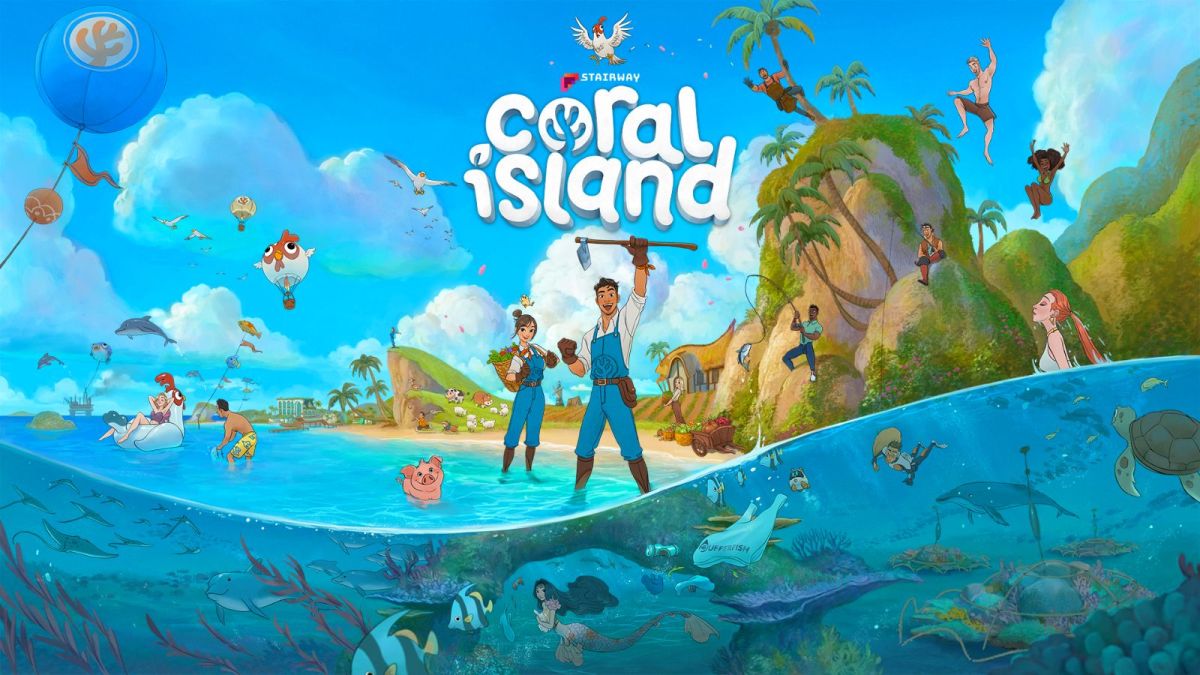The landscape of cozy games and farming simulators is oversaturated enough that it’s difficult for new games to stand out—but Stairway Games and Humble Games’s Coral Island manages to do just that.
Initially presented as a tropical Stardew Valley with high-quality graphics, wherein the player moves into their grandparents’ old farm after leaving the big city, Coral Island quickly proves it can stand on its own feet. With a massive cast of characters who are diverse in skin tone, personality, history, and interests, the player is immersed in the small, sleepy, seaside town of Coral Island, which has been severely impacted by an oil spill on a nearby island that’s destroyed its coral beds and beaches. Trash is everywhere and a big oil company, Pufferfish Drilling Corp, has arrived with the intention of buying up the town for more drilling. But the locals won’t give up their island so easily, and once they ask the player for help with various quests, dozens of cut scenes create a sense of intimacy and an understanding of why Coral Island has become so beloved.
Following a massively successful Kickstarter campaign that was fully funded in 36 hours and earned $1.6 million overall, Coral Island went into early access in October 2022. It leaves early access on November 14, at which point early access players will start brand new save files (the old ones won’t port) with a starting wallet amount equivalent to whatever money they made in the testing phase. This effectively puts Kickstarter backers, early access players, and new players on equal footing going into Coral Island 1.0.
The public release features town decor, events and activities, and more that were not available in early access. Characters have multiple ensembles for the beach and for each season, and when the museum is expanded, you can visit statues representative of the Kickstarter backers who made the game a reality. Coral Island is deeply human in this way, simultaneously embodying the real-life community that’s formed around it and the in-game community seeing long-term sustainability in their daily lives.
At every turn, the game’s small, independent, Indonesian developer team imbues Coral Island with purpose and perspective, including aspects of mythology and culture that make the whole thing feel even more impactful. In addition to restoring magic to the island to heal blighted trees and sacred nature zones, players also participate in in-game events that are grounded in reality, like an annual beach clean-up and a tree-planting festival aimed at reforesting a completely bald part of the once lush forest. There are mermaids whose technology helps heal bleached or dead coral, and there are also humans grappling with the realities of single parenthood, grief, family legacy, classism, and more.
My partner, who played the game early access, said Coral Island will do for the farming sim community what Baldur’s Gate 3 has done for the fantasy RPG community—and they’re absolutely right. My playthrough for this review (about 50 hours to complete Year 1) raised my standards for the genre.
The game made me feel immense emotions I didn’t expect, like the overwhelming joy of seeing the Founders Hall in the museum for the first time and the way each festival was decorated so beautifully that they put me in the mood of the season immediately despite real life being mostly dark and a little cold following daylight savings. I became obsessed with building relationships not just with dateable NPCs (of which there are 28), but with everyone in the town to unlock their cut scenes and learn more about them. I stayed determined in my pursuit of mini-game prizes (there are at least two mini-games at every festival) and I strove to complete as many side quests as possible. When I wasn’t playing Coral Island, I was thinking about Coral Island, and since the developers have more updates planned after release, I don’t see my love for this game depleting anytime soon.
In some ways, Coral Island feels massive because there are so many characters to befriend (or date), areas to explore, clothes to buy, furniture to collect, animals to raise, and more, but it never feels overwhelming in this sense. Days move at a steady clip (although you can choose to slow them down in the settings menu) and some missions or events are time-sensitive, but mostly, you get to play 100 percent at your own pace and in whatever priority order you want. You can be a gay disaster or intentionally remain friends with everyone. You can focus your farm on crop yields or animal products or a little bit of both. You can forage and mine and collect trash to your heart’s content. Kid characters will grow up, time will pass in a meaningful way, and your place in the community will solidify as you play.
If you get into any cozy sim heading into the end of 2023, I strongly recommend you check out Coral Island. The game is available for $24.99 for PC on Steam, with full controller support. (Note: sometimes the d-pad and toggles can make it hard to fine-tune movement, but not to any great detriment.) The game is also available on Xbox X/S (including Game Pass) and PlayStation 5. A Nintendo Switch port is slated for 2024.
(featured image: Stairway Games)









Published: Nov 14, 2023 01:19 pm